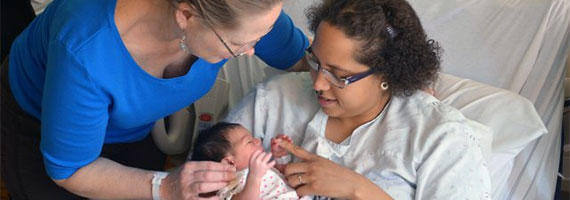Here's a short list of things that are easy for new moms:
- Wanting coffee.
- Wanting sleep.
- Wanting both sleep and coffee all of the time.
Not on that list? Feeding your baby. Feeding babies - by whatever means you chose to do - is not easy. You're exhausted, babies are finicky, formula's expensive, and nipples hurt. (We're talking breastfeeding here, folks. The word nipple might be used again.)
Breastfeeding is not easy. Even for the baby with the perfect latch, the mom with the perfect flow and an abundant supply, learning the whole rhythm of how to get your baby properly fed without destroying your body is just plain hard.
Luckily for us, the new Tricare breastfeeding policy - which generously covers pumps and supplies - is out to make breastfeeding just a little bit easier.
That's music to the ears of every mom in history who has ever even tried to breast feed, because the problems you encounter in what seems like the most natural act of mothering ever are actually really confounding. Especially when you're sleepless and being screamed at by eight pounds of boob-draining hunger.
It's a position many of us have been in at some point: You're up all night with a kid that can't seem to stay latched. You're aching to the point of fantasizing about formula. You can't seem to figure out the whole lanolin thing (Is it before? Is it after? Is it all the time? Imagine the desperation of the first lanolin-smearing mom: Ohhh I hurt so much LET ME SMEAR SOME SHEEP WAX ON MY BOOBS. MAYBE THAT'LL HELP.) but you definitely need something helpful and soon.
Your baby is coming at you, mouth agape, and you're hearing the theme song to Jaws in your head. Your baby is crying and you are crying and at this point your husband's probably crying too ... when you call your doctor to ask for help and advice, your pediatrician is going to tell you to do this one very simple thing: Call a lactation consultant.
Because lactation consultants are there to help.
Most lactation consultants are certified through the International Board of Lactation Consultant Examiners and are credentialed as IBCLCs.
They are affiliated with hospitals, midwifery and OB groups, and sometimes children's healthcare practices, but often, they are stand-alone, private-practice practitioners. They are highly-trained in breastfeeding management and, to countless mothers who have struggled with breastfeeding, they have been the key to breastfeeding success.
The news: Despite all their new breastfeeding support, Tricare isn't covering them. At least that's what we learned for sure in the Tricare Breastfeeding Townhall on June 22.
They ARE covering a number of other types of lactation support. They will cover: Lactation help from a physician, physician's assistant, nurse practitioner, nurse midwife, or RN. That's great news! Hooray! Help with breastfeeding!
But many lactation consultants are just that -- lactation consultants. Chances are high your local IBCLC is left out in the cold with this policy.
If you're currently nursing and looking for help or pregnant and trying to get prepared, this could be bad news. As someone who recently stopped nursing my second child and struggled with it, recurrent mastitis, a staph infection, and more thrush than even our doctor could explain, the best I can do for you is offer my very non-medical advice:
(1) Start with your MTF. Many have affiliated lactation supporters. Free! Help! I will admit I had a HORRIBLE time with our lactation consultants at Walter Reed, but nothing is perfect and the rest of our experience there was great. So maybe you'll have better luck than I did.
(2) Call La Leche League. Now, I will be very honest. I have tons of friends who joke about LLL as "Lactivist Central," but when you're trying to nurse and it's just not working and you desperately want it to, reach out to everyone and their mother. Seriously. LLL can be a wonderful support system, even if you're just using their website (and Kelly Mom) remotely.
(3) Reach out to everyone and their mother. I taught a friend how to pump more efficiently. Another person's mom taught me how to handle a baby choking on a heavy let-down. Ask for help. I realize that until you start nursing, boobs are sort of a hush-hush taboo topic, but once you're in that feeding a baby stage, your boobs are out there.
The good news is that while IBCLC's aren't supported by Tricare, many are reasonably priced and willing to help you. If that isn't an option for you, there are still free services out there - and I (ahem, ahem, not from personal experience here or anything...) have to admit that, worst case scenario, whipping your boob out at the doctor's office to point out to your doc JUST HOW DESPERATELY YOU NEED HELP may work.









